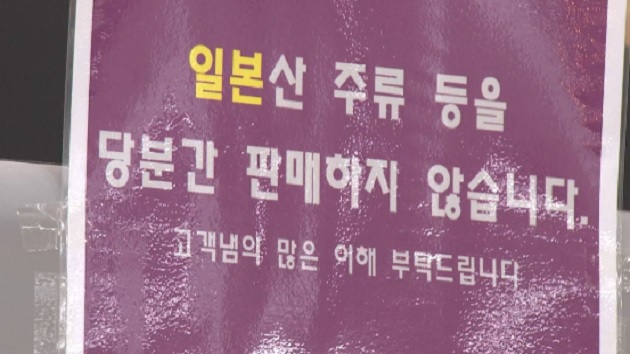
Calls in the nation for a boycott of Japanese goods.
This is in response to Japan’s curbs on the export of parts of semiconductor.
The island also joins the boycott.
Meanwhile, local exporters of agricultural and fishery products are concerned about Japan’s potential suspension of import from Jeju.
Joseph Kim reports.
[slug] Aewol-eup, Jeju City
This is a beer section of a big supermarket in Jeju City.
A notice is posted that reads “No Japanese beer for the time being”.
[slug] Local supermarkets join boycott of Japanese products
The supermarket joins the boycott of Japanese products in response to Tokyo’s restriction on the export of parts of semiconductors.
It is also planning to suspend sales of other Japanese products after the current stock runs out.
[slug] Supermarket seeks alternate products
A representative of the supermarket says that finding alternative products takes effort and time, but most shoppers support the boycott. It is now seeking products to replace Japanese merchandise.
Meanwhile, local crop and fish producers and exporters worry that the boycott would extend over a long period of time and eventually hurt their businesses.
[slug] Agricultural, fishery sector worry about impact from boycott
Because the amount of exports to Japan accounts for 20 percent of Jeju exports.
By export volume, flat fish is the largest export, followed by mandarin concentrate and conch respectively.
With the exception of mandarin concentrate over the last few years, the amount of exports is on the decline.
In this situation, producers of the primary industry worry that their exports to the island nation would drop.
Currently, there are no problems in export of Jeju fish to Japan as the local aquaculture industry satisfies the quarantine standards that are already tightened.
[Reporter] Joseph Kim
[Camera] Hyeon Gwang-hoon
[CG] Lee Ju-yeon
Meanwhile, semiconductors account for a considerable amount of Jeju exports, but the Korea International Trade Association foresees that the sector wouldn‘t be hurt by Japan’s measure as most of the parts are imported from Taiwan and finished goods are exported to Hong Kong.
Joseph Kim, KCTV





